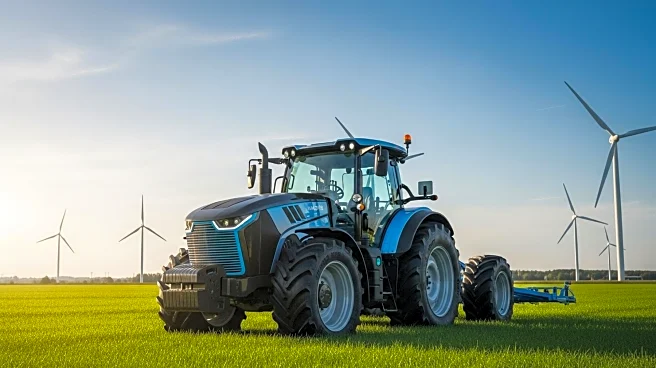What is the story about?
What's Happening?
The global electric farm tractor market is anticipated to grow significantly, reaching USD 426.67 million by 2033, according to a report by Straits Research. This growth is expected to occur at a compound annual growth rate (CAGR) of 10.34% from 2025 to 2033. Electric farm tractors, which are powered by electric motors rather than traditional internal combustion engines, offer advantages such as reduced emissions, lower maintenance costs, and fewer mechanical components. The market expansion is largely driven by the increasing emphasis on sustainable agricultural practices, rising fuel prices, and government initiatives promoting eco-friendly farming technologies. Farmers are increasingly adopting electric tractors due to their reliability, cost-effectiveness, and environmental benefits compared to diesel tractors.
Why It's Important?
The shift towards electric farm tractors represents a significant move towards sustainable agriculture, which is crucial in addressing environmental concerns and reducing carbon footprints. The adoption of electric tractors can lead to lower operational costs for farmers, as they offer reduced fuel expenses and maintenance requirements. This transition is supported by government initiatives and financial incentives, which aim to encourage farmers to invest in eco-friendly machinery. The growth of the electric farm tractor market is likely to benefit small and medium-scale farmers, particularly in regions where government-backed programs provide loans and subsidies for purchasing modern agricultural equipment. This trend could lead to increased agricultural productivity and sustainability, aligning with global efforts to combat climate change.
What's Next?
The electric farm tractor market faces challenges such as the limited availability of charging infrastructure and the prevalence of conventional tractors in rural areas. However, the rising adoption of precision farming presents new growth opportunities. Precision agriculture focuses on optimizing resources to improve efficiency and yield, and electric tractors play a crucial role in enabling data-driven, energy-efficient operations. As battery technology and electric drivetrains continue to advance, the market is expected to see further growth. Additionally, the expansion of equipment rental services may offer cost-effective solutions for farmers, potentially increasing the accessibility of electric tractors.
Beyond the Headlines
The transition to electric farm tractors could have long-term implications for the agricultural industry, including shifts in equipment manufacturing and supply chains. As demand for electric tractors grows, manufacturers may need to adapt their production processes to accommodate new technologies. This shift could also influence the development of related industries, such as battery production and charging infrastructure. Furthermore, the adoption of electric tractors may contribute to broader cultural changes in farming practices, promoting sustainability and environmental consciousness among farmers.

















